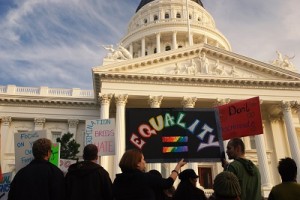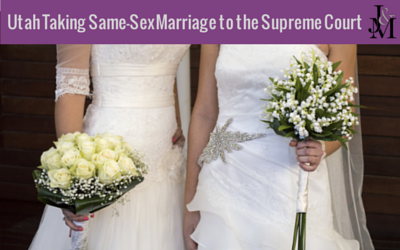The topic of gay marriage has long been a divisive issue within the United States. Marriage was previously defined as a civil union between a man and a woman and, as a result, gay marriage was essentially outlawed in all 50 states for much of the country’s existence. Those who oppose the issue do so predominantly from a religious standpoint, citing Bible verses indicating that such a union should not be granted. Even as countries like Argentina, Brazil, Canada, Mexico and the United Kingdom gradually began recognizing same sex relationships and marriages in general, the United States still found itself far behind in the court of public opinion for many decades.
Gay Marriage California
In the last several years that topic has heated up significantly, with gay marriage becoming legal in a wide variety of different areas. California is perhaps the most notable situation in recent memory, where Proposition 8 was a state constitutional amendment that was created by those who opposed gay marriage. Proposition 8 was passed in November of 2008, it was eventually ruled unconstitutional by a federal court in 2010. Since that time, many other states have followed suit. They include but are not limited to Connecticut, Delaware, Washington, DC, Hawaii, Maryland and more.
Utah Same Sex Marriage
Utah is one of the remaining states where same sex marriage is not legal, though the story has a decidedly unique twist. Same sex marriage actually became legal in Utah for a brief period of time, starting on December 20, 2013 and ending almost immediately thereafter in January. The fact that gay marriage became legal at all during that time was something of a technicality – it was the direct result of a specific ruling attributed to the United States District Court for the District of Utah. The ruling itself was stayed until January 6 by the United States Supreme Court, which is where the small window of opportunity for same sex couples to join hands in marriage originally came from.

More specifically, three same sex couples filed a lawsuit in the District Court in March of 2013 with a desire to ultimately declare Utah’s ban on similar marriages unconstitutional. One of these couples had already been married in Iowa, but Utah refused to recognize that union. Judge Robert J. Shelby of the District Court agreed that the same sex marriage ban was unconstitutional, thus allowing these marriages to be legally performed almost immediately. The State Attorney General’s Office would quickly appeal that ruling, thus ending the ability for these marriages to be performed as soon as a few weeks later in January.
Utah Attorney General
One of the most interesting things about the case actually comes down to its location. Despite the high presence of the Church of Jesus Christ of Latter-day Saints, Salt Lake City was actually recently revealed as the “gayest” city in America in research conducted by Advocate.com. The Latter-day Saints have long maintained a view that homosexuality in general was against their religion. Despite this, those residents of the area who are not a part of the Mormon Church have long embraced their LGBT brothers and sisters within the community. Using a list of very specific criteria, Adovocate.com deducted that Salt Lake City has more gay, lesbian and bisexual residents per capita than any other city in the United States. Indeed, Salt Lake City and Utah in general is regularly at the top of “gay friendly” lists conducted about various places to live within the country.
In the first six days following the aforementioned ruling alone, county clerks in Utah issued more than 900 marriage licenses to same sex couples. Jim Debakis, chairman of Utah’s own Democratic Party, and himself a self-identified gay man, was among the first people to be married during this time. Those counties that did not immediately begin issuing marriage licenses to these couples would soon follow suit in the next few days.
Even though the window of opportunity for same sex couples to get married in Utah would quickly close, the news wasn’t necessarily as bad as it could have been. While it is true that Utah determined that it would not recognize all marriages performed during that time, that wasn’t necessarily the case everywhere. On January 9, for example, the Attorney General in Utah allowed county clerks to complete the processing of all marriage licenses that were in process prior to January 6. Even though the state announced that it would continue to ban same sex marriages, Eric Holder (the Attorney General of the United States) announced that on a federal level, the country would recognize all same sex marriages that had been performed in the state of Utah prior to the ban going back into effect. In that short amount of time, 1,360 marriages had been performed.
Current State of Same Sex Marriage in Utah
The Supreme Court of the United States indicated it will hear Kitchen v. Herbert, which was the case that initiated the legality of same sex marriage in Utah in the first place. It’s important to note, however, that a ruling by the Supreme Court in this matter is not a foregone conclusion. Kitchen v. Herbert is just one of five similar cases that the Supreme Court will examine before its sessions officially begin in the closing weeks of October 2014. During a private conference that will be held before that time it will decide which of the cases, if any, it is going to hear. There is still a distinct possibility that the Supreme Court will choose not to hear Kitchen v. Herbert at all. If the Supreme Court does decide to hear the case, however, it would represent a landmark decision that would have ramifications for every other state moving forward.
Along with the topic of same sex marriage, an equally complicated topic is same sex divorces. Divorces in general are always difficult and stressful situations for everyone involved that are made infinitely more complicated thanks to laws unique to specific states about whether these types of marriages are legally recognized in the first place.
Same Sex Marriage and Divorce
A same sex divorce would fall into one of two different categories: contested or uncontested. A contested divorce would be one where the two parties are unable to come to an agreement for whatever reason, including if one of the two individuals doesn’t want to get divorced in the first place. An uncontested divorce in a same sex marriage situation would be one where both parties agree to an amicable separation and agree to have all assets fairly distributed, among other factors.
Thanks to the fact that same sex couples still cannot legally marry in the state of Utah and in certain other states, child custody issues may arise in the event of a separation. This would also be true in the event that one of the couples who has a federally recognized same sex marriage divorced in the foreseeable future. One of the issues that may arise has to do with child custody, which would create what is known as a contested divorce. If a surrogate was used during the birth of the child, one of the parents would not be genetically related to the child or children in question.
In these types of situations, the court would proceed much the same way that it does in traditional uncontested divorces, albeit while keeping well within the confines of the state’s take on the topic of gay marriage. The court will consider a large number of different factors including the best interests of the child when determining who gets sole custody or any partial custody agreements that may take place.
Salt Lake City Family Law Attorney
Another point of difficulty in ending a same sex relationship would be a situation where a couple married in a state where gay marriage was legally recognized moved to a state that was still upholding a ban. If a person moves to a state where same sex marriage is not legally, they may not be able to get a divorce in that state due to the fact that their marriage was never legally recognized in the first place. They would either have to return to the state where the union was originally approved or work within the confines of the state in question for the most viable solution. In all of these situations, enlisting the help of a family law firm would certainly help expedite the process for the benefit of everyone involved. For help with your family law case in Utah, take advantage of a free case review from Jennings and Medura Law Firm today.


